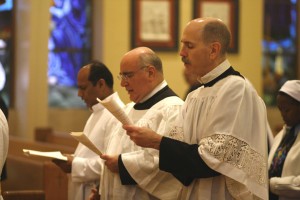Bishop Richard F. Stika will preside at Solemn Vespers for the Consecrated Religious on Sunday, Feb. 9, at Sacred Heart Cathedral. The service begins at 4 p.m.

Father Jerry Tully, CSP, right, joins Father Ron Franco, CSP, center, and Father Joseph Thomas, left, at Solemn Vespers for the Consecrated Religious in February 2013.
Consecrated life is a broad term encompassing all those men and women who practice the evangelical counsels of poverty, chastity and obedience. These counsels configure persons to Christ, who himself was poor, chaste and obedient. This life is a visible participation in the life of the Trinity. God the Father calls men and women to emulate the life of his Son, Jesus Christ, through the guidance and help of the Holy Spirit. The ultimate goal of consecrated life is to direct the eyes of the faithful “towards the mystery of the Kingdom of God already at work in history, even as it awaits its full realization in heaven” (Vita Consecrata, 1).
Today, consecrated life exists in many forms: hermits, consecrated virgins and widows, religious life, secular institutes, and societies of apostolic life. While all of these ways of living the evangelical counsels are a gift of the Holy Spirit to the Church, each has its unique form of expression. The Holy Spirit grants a particular gift, called a charism, to each person and each institute in order to build up the Church. These charisms are visibly expressed in apostolic works and spirituality. Even those institutes completely devoted to contemplation are considered to have a “hidden apostolic fruitfulness” (VC 8) that contributes to the growth of the Church.
The Diocese of Knoxville has 19 communities of consecrated life. All parishioners are asked to join the consecrated men and women of the Diocese of Knoxville in praying in gratitude for the gift of this vocation in the Church. After the celebration of Solemn Vespers on Feb. 10, there will be a reception in the Sacred Heart school lobby where parishioners will have a chance to meet some of the consecrated men and women present in the diocese.
